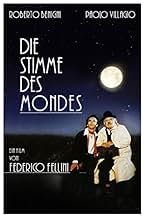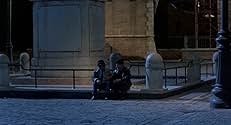ÉVALUATION IMDb
6,3/10
3,5 k
MA NOTE
Ajouter une intrigue dans votre langueThe amusing and entertaining adventures of a recently released mental patient and his band of misfits, who discover conspiracies to participate in while looking for love.The amusing and entertaining adventures of a recently released mental patient and his band of misfits, who discover conspiracies to participate in while looking for love.The amusing and entertaining adventures of a recently released mental patient and his band of misfits, who discover conspiracies to participate in while looking for love.
- Prix
- 5 victoires et 9 nominations au total
Avis en vedette
Not many directors would choose the end of their career to head off in an entirely new direction, but that is very much what Fellini does here. This was his first film based on a novel (Ermanno Cavazzoni's "Il poema dei lunatici") and quite a radical departure in terms of style.
In a move which apparently alienated many of his traditional audience, the film-world is almost entirely the one experienced by the central characters, Ivo Salvini and to a lesser extent Gonnella. This subjectivity of approach was of course used in "8 1/2" but in a less extreme and clearly autobiographical way. Here, Fellini makes the brave decision to keep contextualisation and explanation to a minimum, leaving the unwary viewer flailing about in search of a foothold. As Ivo's state of mind drifts between lucidity and hallucination, we seldom know what is 'real' and what is imagined, even down to the words spoken by other characters.
"Felliniesque" themes such as the love/fear of women, religious superstition and motifs like madonna statues and mountains of pasta are revisited from this rather skewed perspective, but the film overall has a dislocated feel which is far away from the likes of Roma or Amacord.
Interestingly, Benigni is asked to act here, rather than doing his usual schtick, and does well as a Chaplinesque figure who occasionally reminds one of Guilietta Masina.
This is certainly not what you might call classic Fellini (he confessed to a crisis of confidence writing it) but there is much to enjoy and to wonder at in this last work. The man himself regarded it as the "orphan" of his films and hoped it would come to be better regarded.
Devotees of Terry Gilliam will note the original of the waltz scene lifted for the following year's "Fisher King".
In a move which apparently alienated many of his traditional audience, the film-world is almost entirely the one experienced by the central characters, Ivo Salvini and to a lesser extent Gonnella. This subjectivity of approach was of course used in "8 1/2" but in a less extreme and clearly autobiographical way. Here, Fellini makes the brave decision to keep contextualisation and explanation to a minimum, leaving the unwary viewer flailing about in search of a foothold. As Ivo's state of mind drifts between lucidity and hallucination, we seldom know what is 'real' and what is imagined, even down to the words spoken by other characters.
"Felliniesque" themes such as the love/fear of women, religious superstition and motifs like madonna statues and mountains of pasta are revisited from this rather skewed perspective, but the film overall has a dislocated feel which is far away from the likes of Roma or Amacord.
Interestingly, Benigni is asked to act here, rather than doing his usual schtick, and does well as a Chaplinesque figure who occasionally reminds one of Guilietta Masina.
This is certainly not what you might call classic Fellini (he confessed to a crisis of confidence writing it) but there is much to enjoy and to wonder at in this last work. The man himself regarded it as the "orphan" of his films and hoped it would come to be better regarded.
Devotees of Terry Gilliam will note the original of the waltz scene lifted for the following year's "Fisher King".
The bitterness is the basic trait of this last Fellini. You discover all what you know or define as Felliniesque. You admire Roberto Begnini , being more prepared to remind scenes from his last Pinocchios. You feel pity and admiration about characters. And you feel the fall of a world, suggested, in so precise manner, by entire atmosphere defining a simple - baroque good bye. A film only reminding themes, characters, idiosincrasies. And the bitterness as basic virtue.
Is La Voce Della Luna one of Fellini's very best? Not for me, I consider the likes of Nights of Cabiria, La Dolce Vita, 8 1/2 and Amarcord better movies. But it is one of his most underrated movies. Some of the structure is a little dislocated, but even with that there is still much to like. Watching the visuals it is like visual lyric poetry, every frame is beautifully shot and the scenery is really stunning. The music is beautiful as well and Fellini's direction is superb with his themes of women and religious superstition on display and conveyed interestingly and intelligently. There is definitely his unique style, not just in the basic feel of the film but also in its themes. La Voce Della Luna is mostly very moving and haunting in feel as well. The acting is great, Roberto Benigni gives one of his most humanistic and understated performances and it is just wonderful and very natural, while Paolo Villaggio contrasts superbly with him. Overall, deserves to be better known as it is a very good movie. Not classic Fellini but should be more well known as just his last film. 8/10 Bethany Cox
I love how subtly the real mixes with the unreal in Fellini's movies to the point that you are not quite sure which is which anymore. I love the poetry, a mad poetry of love, mystery and revelations. Benigni's role in this film is glorious. This film is drenched in an art of dreamy quality. Paolo Villagio is great in this movie too carrying an entirely different madness to that of Benigni's character. I just love the structure of this film as well as the poetic script. This film really moved me into a hypnotic state. Fellini is the Jung of movies, taking you further and further, deeper and deeper into a trance and then finally after putting you through a maze, a labyrinth of complex psychological truths tells you "Now look!"
It is a pity that Fellini's last film is not better known as it represents something of a return to form after a series of disappointments. .Fellini's visual imagination is still intact but some of the wonderful precision of imagery is no longer present. Perhaps by the end of his career too many of his old collaborators had died or retired. The best part is the first half hour seen entirely from the perspective of the insane central characters. Their obsession with the moon provides the alibi for many evocative night shots, (I've often thought that one thing that distinguishes great film makers is how they film the night), as well as the spectacular climactic sequence when they imagine that they have trapped the moon. Elsewhere there is typical Fellini fun with the crowning of 'Miss Flower' complete with an outsize King and Queen of the Gnocci and a final shower of flower on all the contestants. 'La voce della Luna' shares much of 'Ginger and Fred's' distaste for the contemporary world summed up in a sequence in which a disco rave is interrupted by a Strauss waltz. This is far more poetic and unexpected than anything in the predictable 'Ginger and Fred'. Those worried by the narrative incoherence of Fellini can bury their boring heads in a screen writing manual. Perhaps the current international popularity of Roberto Benigni, little known outside Italy when the fim was made may yet allow this flawed but haunting film to gain the audience it deserves.
Le saviez-vous
- AnecdotesEven the original (Italian) dialogue was re-dubbed in order to increase the feeling of unreality. However, this is not a unique feature for this particular movie among Fellini's. On the contrary, it was very common for him to ask his performers to speak out loud randomly chosen numbers instead of the actual script text. Then the main cast would re-dub itself, the supporting cast being most of the time re-dubbed by a few specialized actors. It has to be said that in Italy direct sound wasn't much in use until the French 'Nouvelle Vague' made a massive use of it, in the name of realism, and thus became an example for the Italian film industry. Re-dubbing remained nonetheless a common practice, and an excellent one at that until the 1980s, and Fellini took advantage of its possibilities to increase the feeling of unreality in all of his movies by asking his dubbers (all of them) not to perfectly lip-sync. The only exceptions to this technique are his very early works, where the famous dreamlike world and sensitivity of the director aren't still outlined.
- ConnexionsFeatured in Verso la luna con Fellini (1990)
- Bandes originalesThe Way You Make Me Feel
Written & performed by Michael Jackson
Meilleurs choix
Connectez-vous pour évaluer et surveiller les recommandations personnalisées
- How long is The Voice of the Moon?Propulsé par Alexa
Détails
- Date de sortie
- Pays d’origine
- Langues
- Aussi connu sous le nom de
- The Voice of the Moon
- Lieux de tournage
- sociétés de production
- Consultez plus de crédits d'entreprise sur IMDbPro
Box-office
- Brut – à l'échelle mondiale
- 23 222 $ US
- Durée2 heures 6 minutes
- Couleur
- Rapport de forme
- 1.66 : 1
Contribuer à cette page
Suggérer une modification ou ajouter du contenu manquant

Lacune principale
By what name was La voce della luna (1990) officially released in India in English?
Répondre














